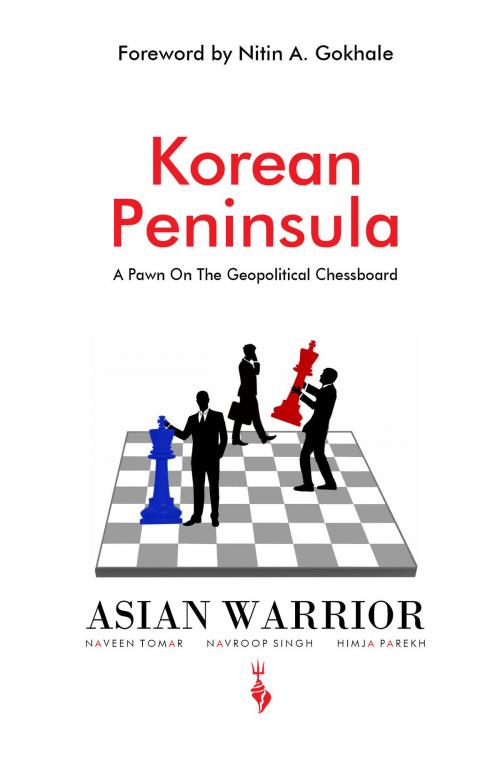Korean Peninsula
A Pawn On the Geopolitical Chessboard
Nonfiction, Social & Cultural Studies, Political Science, International, International Relations| Author: | Naveen Tomar, Navroop Singh, Himja Parekh | ISBN: | 9781543937015 |
| Publisher: | BookBaby | Publication: | June 7, 2018 |
| Imprint: | BookBaby | Language: | English |
| Author: | Naveen Tomar, Navroop Singh, Himja Parekh |
| ISBN: | 9781543937015 |
| Publisher: | BookBaby |
| Publication: | June 7, 2018 |
| Imprint: | BookBaby |
| Language: | English |
Korean Peninsula, A Pawn on the Geopolitical Chessboard is Asian Warrior's second book after gaining critical acclaim for The New Global Order. The book authored by Naveen Tomar, Navroop Singh and Himja Parekh focuses on the Korean Peninsula which has been divided between North and South Korea. The world has always been at war over resources behind the façade of trade, politics, religion and ideology. Though the global order has evolved, the key has always been geography for "he who controls the geography, controls the resources and has the power to dictate both war and peace". History is testament that whenever new borders are drawn, the seeds for future conflict are sown and the tale of the two Koreas is no different. Exploring the Korean Peninsula's Neo-Confucianism ideology, the book shows how this doctrine has impacted the peninsula's past, present and future. By tracing events on the peninsula from the time of unified Korea under the Joseon Dynasty to the Japanese occupation, World War 2 and current scenarios, the book elaborates how the global powers have used the Korean Peninsula as a platform for their geopolitical agenda to carve out spheres of influence to stay relevant. The book explores the North Korean mindset along with the evolution of its founding principles and shows its journey as part of the "Axis of Evil" that threatens global security and takes the reader on a journey to understand the role of the different countries and blocs on the Korean Peninsula showing how tangled the peninsula is in the quest for global supremacy. Today North Korea's nuclear ambitions and its association with rogue nations threaten global peace as North Korea is the only country to have tested nuclear weapons in the 21st century. But that is not the complete story or the reason for the sudden resurgence of the Korean crisis. In the Fourth Industrial Revolution that we are on the brink of, the Korean Peninsula is very significant. Nature has blessed the Korean Peninsula with abundant mineral resources to become a player of global significance but this blessing much like Afghanistan is also a curse. In the great global churn due to the Fourth Industrial Revolution, old powers will be forced to make way for the new. Data is replacing Oil and Gas as the new gold and thus everything related to it will be up for grabs. The world will see a thirst for different mineral resources as power hungry corporations, intelligence agencies and countries will jostle each other for supremacy. The book also examines the possible hypothesis that could emerge from this global churn. The Korean Peninsula has been reduced to a pawn in the fight by those who covet its bounty. The Peninsula's two nation states of contrasting ideologies that are influenced by different powers and their proxies would never want it to rediscover its united grandeur independently. Will the Korean Peninsula get a chance to reclaim its rightful place on the map or is it forever doomed to remain "A Pawn on the Geopolitical Chessboard?"
Korean Peninsula, A Pawn on the Geopolitical Chessboard is Asian Warrior's second book after gaining critical acclaim for The New Global Order. The book authored by Naveen Tomar, Navroop Singh and Himja Parekh focuses on the Korean Peninsula which has been divided between North and South Korea. The world has always been at war over resources behind the façade of trade, politics, religion and ideology. Though the global order has evolved, the key has always been geography for "he who controls the geography, controls the resources and has the power to dictate both war and peace". History is testament that whenever new borders are drawn, the seeds for future conflict are sown and the tale of the two Koreas is no different. Exploring the Korean Peninsula's Neo-Confucianism ideology, the book shows how this doctrine has impacted the peninsula's past, present and future. By tracing events on the peninsula from the time of unified Korea under the Joseon Dynasty to the Japanese occupation, World War 2 and current scenarios, the book elaborates how the global powers have used the Korean Peninsula as a platform for their geopolitical agenda to carve out spheres of influence to stay relevant. The book explores the North Korean mindset along with the evolution of its founding principles and shows its journey as part of the "Axis of Evil" that threatens global security and takes the reader on a journey to understand the role of the different countries and blocs on the Korean Peninsula showing how tangled the peninsula is in the quest for global supremacy. Today North Korea's nuclear ambitions and its association with rogue nations threaten global peace as North Korea is the only country to have tested nuclear weapons in the 21st century. But that is not the complete story or the reason for the sudden resurgence of the Korean crisis. In the Fourth Industrial Revolution that we are on the brink of, the Korean Peninsula is very significant. Nature has blessed the Korean Peninsula with abundant mineral resources to become a player of global significance but this blessing much like Afghanistan is also a curse. In the great global churn due to the Fourth Industrial Revolution, old powers will be forced to make way for the new. Data is replacing Oil and Gas as the new gold and thus everything related to it will be up for grabs. The world will see a thirst for different mineral resources as power hungry corporations, intelligence agencies and countries will jostle each other for supremacy. The book also examines the possible hypothesis that could emerge from this global churn. The Korean Peninsula has been reduced to a pawn in the fight by those who covet its bounty. The Peninsula's two nation states of contrasting ideologies that are influenced by different powers and their proxies would never want it to rediscover its united grandeur independently. Will the Korean Peninsula get a chance to reclaim its rightful place on the map or is it forever doomed to remain "A Pawn on the Geopolitical Chessboard?"















